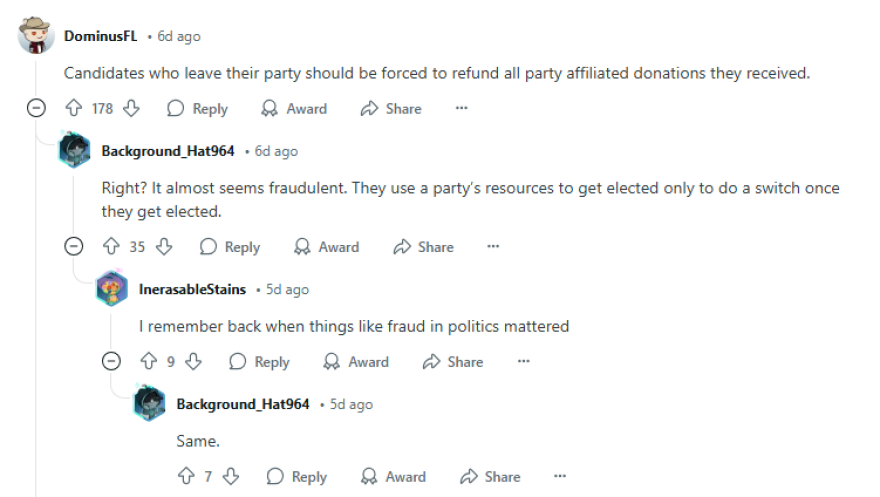Former Florida Senate Minority Leader Jason Pizzo recently made headlines after changing his political party from Democratic to NPA, or no-party affiliation.
Pizzo told fellow lawmakers about the change on the Senate floor on April 24.
"The Democratic Party in Florida is dead, but there are good people that can resuscitate it," he said. "But they don't want it to be me."
READ MORE: 'There is no party': Senate Leader Jason Pizzo explains his surprise exit from the Democratic Party
Pizzo said the move would give him more freedom.
"I think stripping myself of a title of a party designation allows me to run free and clear, clean and transparent and help many, many more [people]," he said.
But despite his reasoning, some Reddit users think Pizzo's move was unfair.
"Candidates who leave their party should be forced to refund all party-affiliated donations they received," wrote one user after a news article about Pizzo's switch was posted on the "florida" subreddit.
Other users vented similar frustrations after Florida House Reps. Hillary Cassel and Susan Valdés changed from Democrats to Republicans shortly after their November re-elections.
ALSO READ: Florida House Democrats flip Republican

Why candidates change parties
"There's nothing that keeps them from switching. There's no law against it," said Susan MacManus, a distinguished professor emerita of political science at the University of South Florida.
Politicians switching parties can be "very frustrating to people who voted for them" because the optics make it seem like opportunistic moves, rather than being in the best interest of their constituents, according to MacManus.
But changing party affiliation is not that uncommon, she said.
MacManus gave three common reasons why politicians switch parties:
"One is obviously that they've become very disenchanted with some issue that their party has taken a strong stance on. That's a common one," MacManus said.
"Another one is that they say, 'Well, I've changed myself and how I look at politics, and I want to run for office next year, and I might have a better chance in changing parties now so that my name gets out there,'" she added.
"But a third reason that's also important is that people are thinking ahead to next year's election," MacManus said.
Florida voters will select a new governor, state house and senate seats, and other legislative roles in the 2026 November general election.
A person seeking nomination as a candidate must be a member of that political party for 365 days before the beginning of the qualifying period, according to state law. So, any politician who would want to run in the state's gubernatorial race next year would have to file documents or make necessary party changes before June 8, 2025.
Some lawmakers change parties after seeing how their district's demographics and politics have shifted, MacManus added.
"There are counties and places in Florida where if you took data from two years prior election and tried to run next year, you probably would have a very difficult time," she said.
If you have any questions about the legislative session, you can ask the Your Florida team by clicking here.
This story was produced by WUSF as part of a statewide journalism initiative funded by the Corporation for Public Broadcasting.
Copyright 2025 WUSF 89.7





